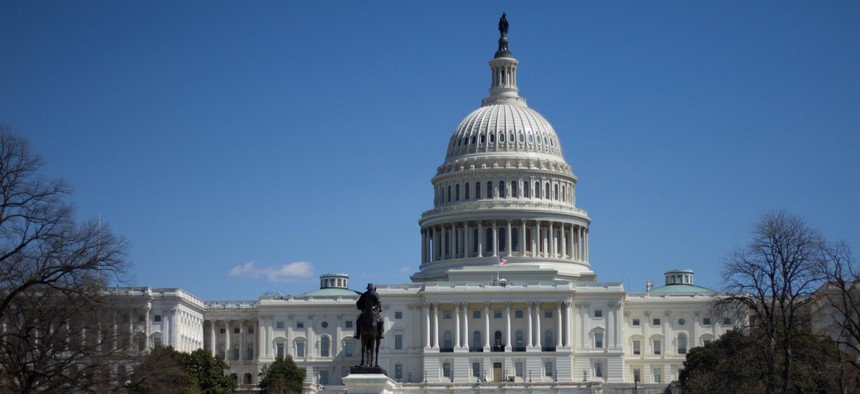Law Enforcement Grants Would Get Funding Bump Under Senate Bill

U.S. Capitol Shutterstock

Connecting state and local government leaders
The draft measure also includes additional money for programs meant to help quell opioid and heroin abuse.
WASHINGTON — Federal grants that flow to state and local police agencies, and spending on programs intended to combat the opioid addiction crisis plaguing parts of the U.S., would see modest upticks under a proposal a Senate panel advanced on Tuesday.
The fiscal year 2019 spending legislation covers the U.S. Department of Justice, the Commerce Department and related agencies. It cleared a Senate Appropriations subcommittee with bipartisan support. The full Senate Appropriations committee is set to consider it on Thursday.
Lawmakers proposed a total of $63 billion of discretionary spending in the bill, an increase of $3.4 billion over current levels. Senate appropriations leaders are for now seeking to avoid controversial policy riders that would threaten to derail their spending bills.
"There’s no shortage of contentious issues connected to this bill," noted Sen. Jerry Moran, the Kansas Republican who chairs the panel that advanced the legislation.
A text of the draft bill was not publicly available on Tuesday, but Democrats and Republicans on the subcommittee issued separate summaries that described highlights.
The bill proposes about $482 million of spending to help curb the distribution and abuse of heroin, fentanyl and illegal prescription opioids, according to the Democratic summary.
That amount includes $360 million for Comprehensive Addiction and Recovery Act, or CARA, grants, an amount $30 million above 2017 levels, the summary says. Congress allotted $330 million for CARA grants and related anti-opioid-abuse programs for this fiscal year.
Funding for the Edward Byrne Memorial Justice Assistance Grant program, commonly called Byrne JAG for short, would be $445 million, up about $29.5 million from the current 2018 budget cycle.
The grant program is a main source of federal money for state and local criminal justice agencies and helps cover a wide range of activities, such as technology upgrades, mental health programs, and courts.
Republican and Democratic lawmakers on the subcommittee voiced frustration that the Department of Justice has withheld grants through the program because of ongoing legal fights involving the Trump administration's effort to clamp down on "sanctuary" jurisdictions that limit cooperation with federal immigration authorities.
Complicating matters is that the term "sanctuary" in this context lacks a clear legal definition under federal law.
Sen. John Boozman, an Arkansas Republican, praised the proposed funding increase for the Byrne JAG program, but noted the money hasn't begun flowing this year. “The problem that we’ve got is, is that we’ve plussed it up, but I believe the fiscal year ‘17 and ‘18 funds have still not been released," he said.
Boozman emphasized that there is no question some states and localities are adhering to federal immigration enforcement law.
"Those communities should get the funding that they deserve," he added.
Sen. Jeanne Shaheen, of New Hampshire, who is the top Democrat on the subcommittee, said she shared these concerns and had raised them previously with U.S. Attorney General Jeff Sessions.
“Those states that are in compliance, that don’t have an issue, it doesn’t seem fair to me that they’re still holding onto those funds," she said.
Shaheen expressed interest in drafting a letter with other lawmakers urging the Justice Department to release the grant money.
Elsewhere in the legislation, $235 million is proposed for Community Oriented Policing Services, or COPS, hiring grants. That would be a $9.5 million increase compared to the current fiscal year, according to the Democratic summary of the bill.
The COPS program is meant to assist state and local law enforcement with policing efforts geared toward building trust between police and the communities where they work.
Lawmakers also included language in the bill that would block the Justice Department from spending money on efforts that interfere with state-regulated medical marijuana activities.
The 2019 federal fiscal year begins on Oct. 1. Lawmakers are crafting spending legislation based on an overarching two-year budget agreement that also covers the current 2018 fiscal year.
Bill Lucia is a Senior Reporter for Government Executive's Route Fifty and is based in Washington, D.C.

NEXT STORY: Funding Steady for Environment, Interior Programs in Senate Bill





